Hi!
Today, you’ll learn all about Japanese set phrases.
What are they exactly? Think of them like this. Japanese Set Phrases are set in stone, they’re used over and over again and they’re blurted out automatically in certain situations. For example… someone sneezes. What do you say? Bless you – without thinking. Why? Set phrase.
In the case of Japanese Set Phrases, it’s part of the language and culture. That’s why.
So take this lesson and…
- Read and review and review and review: SUCCESS comes from repetition and practice!!
- Print it out as physical review material (I do this a lot)
- Create your own sentences by plugging in your own words into A and B
- Leave a comment with your sentences
So, let’s learn the 7 Japanese set phrases all beginners should know.
 | Want FREE Japanese Grammar & Vocab Cheat Sheets? Click Here to Get 20+ Cheat Sheets from JapanesePod101 (a Japanese learning program.) |
1) Yoroshiku Onegaishimasu
- よろしくお願いします
- Please treat me well
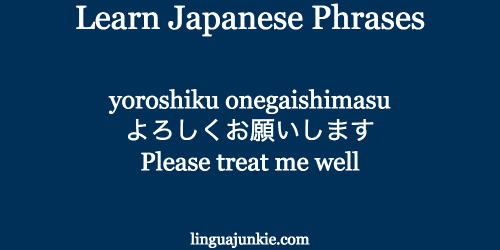
What does Yoroshiku Onegaishimasu mean?
This set phrase means “please treat me well.” It’s used usually when you meet someone for the first time. And you ask them to treat you well. Why? Well, why not It’s politeness and part of Japanese culture. Let’s break down this phrase:
- Yoroshiku comes from yoroshii meaning good/well.
- Onegai means request and shimasu means to do – so here, you’re asking them to do something. It’s a polite way of asking someone to do something for you.
2) Tadaima
- ただいま
- I’m home!
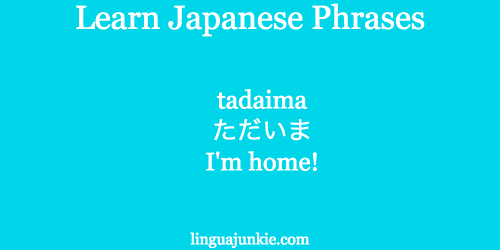
Japanese people say this when they come home. “Tadaima!” And yes, all it means is… “I’m home” Now, let’s say you’re coming home to someone and don’t live alone. In response to this set phrase, there’s another one….
3) Okaeri
- okaeri (casual)
- okaerinasai (polite)
- おかえり (casual)
- おかえりなさい (polite)
- おかえりなさい (polite)
- Welcome home.
This is the Japanese phrase to respond to a “tadaima.” You say “Welcome home” with “Okaeri” or “Okaerinasai.” The difference between the two is politeness.
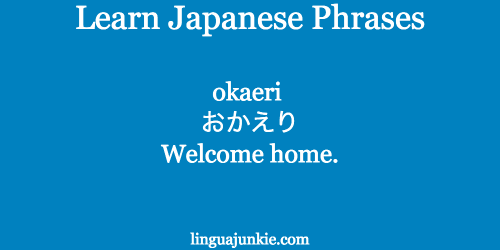
4) Ojamashimasu
- おじゃまします
- I will disturb you
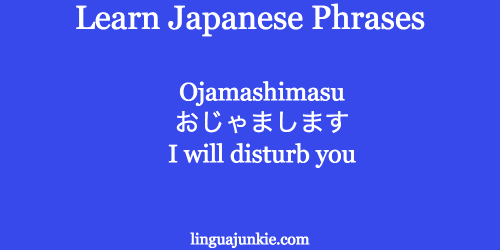
Jama means disturbance and shimasu means to do – so you’re literally saying you will disturb them. However, this is used when you enter someone’s home as a guest.
5) Itadakimasu
- いただきます
- I will receive
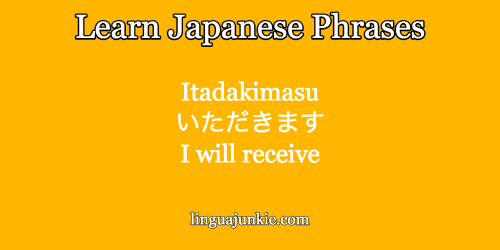
Ignore the literal meaning. Itadakimasu is used before you eat. Why? It’s a polite way of “receiving” and showing appreciation for the food someone that has prepared for you. Again, not something to think too deeply about. Just say the word & eat the food! Many Japanese people say that without thinking too.
Now after you’re done eating… there are more Japanese set phrases to know.
6) Gochisou-sama deshita
- ごちそうさまでした
- You were a feast giver!
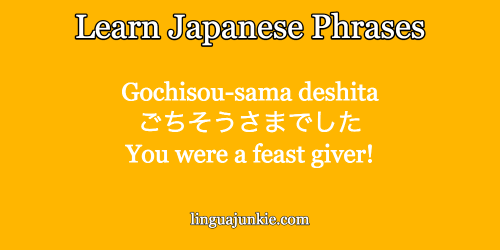
This set phrase is used to thank the cook. Again, don’t think too much into the literal meaning above but… if you’re interested.. “gochisou” means “feast,” “sama” is an honoric you attach to someone’s name to show respect, and “deshita” is “was.”
But all you really need to know is… use this phrase to thank someone for the meal.
7) Otsukare-sama desu
- おつかれさまです
- You worked hard today
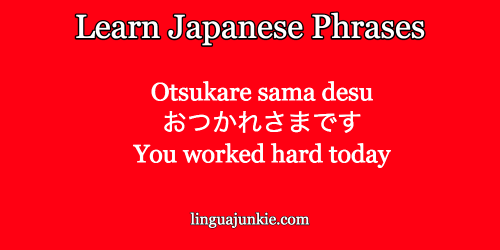
Ah, one of the most confusing Japanese set phrases.
You may hear it as any of the below depending on the level of politeness.
- おつ (otsu)
- おつかれ (otsukare)
- おつかれさま (otsukare sama)
- おつかれさまです (otsukare sama desu)
- おかれさまでした (otsukare sama deshita)
When do you use “otsukare same desu”? What does it mean? Allow me to place some context. You and your friends are finishing a game of basketball and you’re all tired. Or, all of you built a house. Or, you and your coworkers had a day at work.
Either way, you worked hard and you’re tired. This is a set phrase used to say bye in such situations. Textbooks translate/intrepret this as “thank you for your hard work” or “you worked hard today.”
So, use it to 1) say bye after such things or 2) use it to acknowledge someone’s hard work. In the case of #2, your friend can text you and say that they finished work. You can tell them otsukare sama desu. Or your friend tells you they spent the afternoon tricking to pick up girls with no success… tell them otsukare-sama desu.
You can learn more in my other guide here: otsukaresama deshita meaning
Conclusion on Japanese Set Phrases
And we’re done.
By now, you know the 7 Japanese set phrases that all beginners should know. If I missed any, or if you want to see more on this, LEAVE A COMMENT BELOW!!
This lesson is, of course, for beginners.
Let me know what you think.
Be sure to review this lesson!
– The Main Junkie
P.S. I highly recommend this for Japanese learners. If you REALLY want to learn to Japanese with effective lessons by real teachers – Sign up for free at JapanesePod101 (click here) and start learning!
[…] food? The Japanese say “itadakimasu” before they eat. This is what’s known as a Japanese set phrase — a phrase used with certain occasions… like eating! But, as with all beautiful Japanese […]
[…] Note: This is a Japanese set phrase. […]